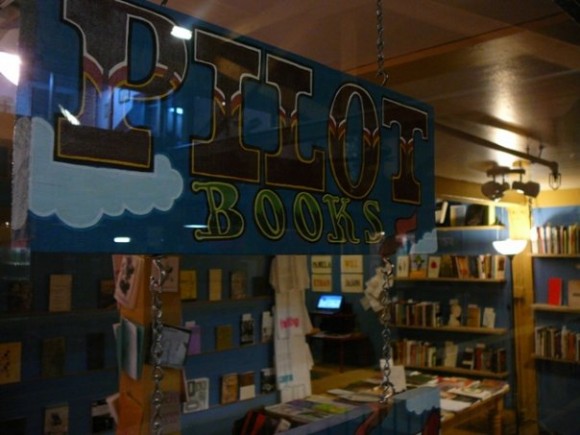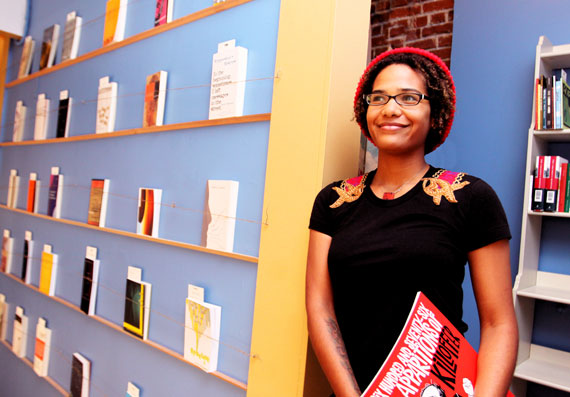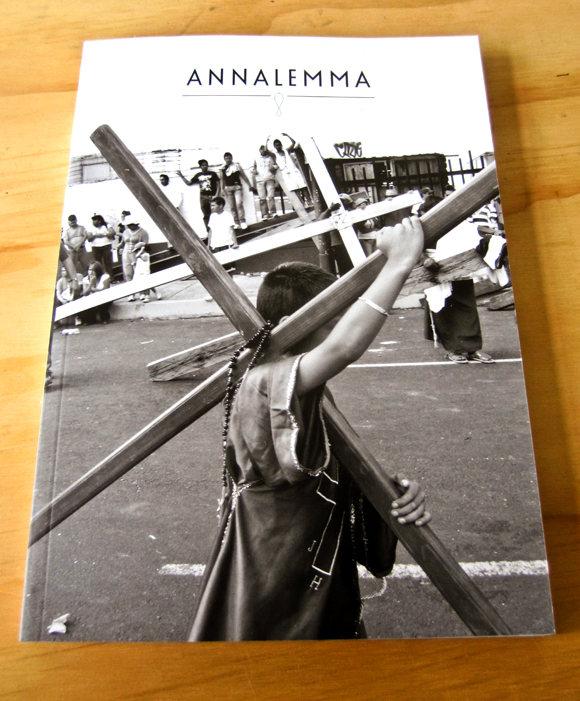Very few book stores in the world are dedicated exclusively to independent presses. The number is something close to none. That’s what makes Seattle’s Pilot Books an amazing store. Co-creative director, Tom DeBeauchamp, took some time from helping proprietor Summer Robinson (pictured) to answer a few questions via email.
What’s Pilot’s origin story?
If you wanted indie-lit in Seattle two years ago you would have had to have driven to Portland. A few stores carried a few books, a few zines, but none in a really meaningful way. People in town asked themselves, “why don’t we have something like the Independent Book Room at Powell’s?” One of these people was Summer. She started Pilot as a few shelves in the window of the Anne Bonny (a sadly defunct oddity shop). When they moved into a smaller space, Pilot moved into a larger one. We’ve been open now for over a year.
What’s the curatorial process when choosing books to stock?
Out motto is 100% indie-lit, so everything we sell in the store and online is independently produced. We tend to stock new releases, typically produced by small houses in small runs, but that’s definitely not a rule. We love selling local work, but that’s not necessarily a rule either. We try to stock to our tastes, and, once upon a time, every book we sold had been read by one of us. Basically, we sell the most interesting fiction, poetry, and comics we can find in whatever language we find it in.
What’s the arts/literature scene in Seattle like and what role does Pilot play within it?
Hard to say what the arts/literature scene in Seattle is like: inter-flowing tribelets? The particles of one tribelet moving freely into the gases and matter of others? A lot of works are made in metal and fire. Readings happen often in many venues, a lot of them free. There’s a very strong book arts community, one of the largest Zine Archives in the world, and many active arts organizations and grant-granting organizations. There’s a feeling that we’re moving toward a more crystallized literary “scene”, but I’m not sure where we’re at in that transition, or if it’s over and we’re the cut gem we always hoped to grow up to be. Pilot, for our part, hosts about four readings a week, a writer’s group. In March, in honor of Small Press Month, we hosted a reading every single day. This summer we’ve hosted more than a dozen Micro-Residents. We will be publishing chapbooks for each of them this fall.

What helps a book sell? What’s been the most successful book at Pilot?
Readers with money and a sense of direction, and the willingness to use them. Having more than one of something in stock also seems to help. People don’t like to buy your last copy. I think saying, “Oh my god! You have to buy that book! It’s amazing” would help, but the data’s inconclusive.
How does a brick-and-mortar store not only survive, but maintain relevance in the age of Amazon?
By doing things differently, catering to a different kind of audience. The big companies do a good job of selling you exactly what you want, but I like to think Pilot provides an introduction and a context to something at least as meaningful and vibrant as Dan Brown’s fine novels. It’s hard to believe the death of Books, death of reading, death of bookstores Chicken-Littleing when you see the passionate work produced everyday. Selling those works, and championing them, helps us to stay relevant alongside Amazon. Really, you could probably start calling this the age of Pilot.
Please describe the cat that lives in your store. If you don’t have a bookstore cat, please explain why.
No cat, sadly. Pilot’s too small a space to keep a shop cat happy and healthy. Besides, kitty wouldn’t get a lick of toilet-time privacy.























Woohoo!
Get you copies of Annalemma here